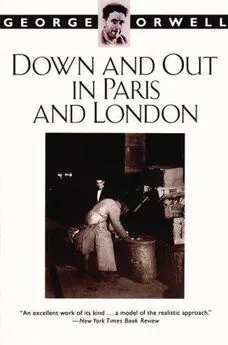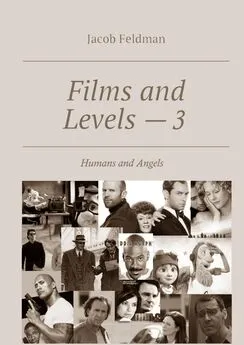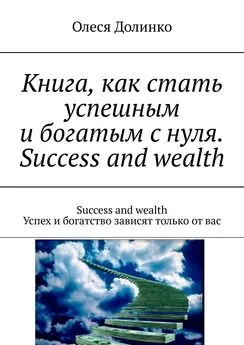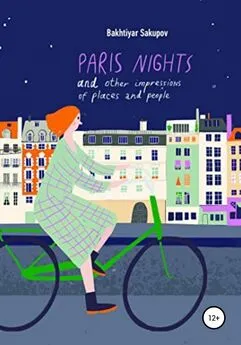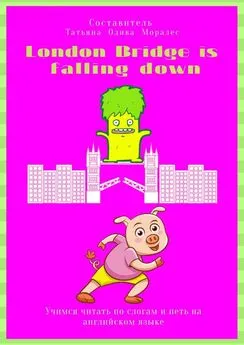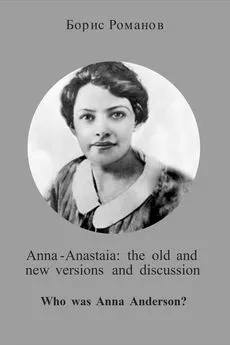George Orwell - Down and Out in Paris and London
- Название:Down and Out in Paris and London
- Автор:
- Жанр:
- Издательство:неизвестно
- Год:неизвестен
- ISBN:нет данных
- Рейтинг:
- Избранное:Добавить в избранное
-
Отзывы:
-
Ваша оценка:
George Orwell - Down and Out in Paris and London краткое содержание
Down and Out in Paris and London - читать онлайн бесплатно полную версию (весь текст целиком)
Интервал:
Закладка:
shouting and hilarious mood finished.
By one o'clock we were not happy any longer. We
felt the joy of the evening wearing thin, and called
hastily for more bottles, but Madame F. was watering
the wine now, and it did not taste the same. Men grew
quarrelsome. The girls were violently kissed and hands
thrust into their bosoms and they made off lest worse
should happen. Big Louis, the bricklayer, was drunk,
and crawled about the floor barking and pretending to
be a dog. The others grew tired of him and kicked at
him as he went past. People seized each other by the
arm and began long rambling confessions, and were
angry when these were not listened to. The crowd
thinned. Manuel and another man, both gamblers, went
across to the Arab
bistro , where card-playing went on till
daylight. Charlie suddenly borrowed thirty francs from
Madame F. and disappeared, probably to a brothel. Men
began to empty their glasses, call briefly, «
'Sieurs, dames !"
and go off to bed.
By half-past one the last drop of pleasure had
evaporated, leaving nothing but headaches. We perceived
that we were not splendid inhabitants of a splendid
world, but a crew of underpaid workmen grown squalidly
and dismally drunk. We went on swallowing the wine,
but it was only from habit, and the stuff seemed suddenly
nauseating. One's head had swollen up like a balloon, the
floor rocked, one's tongue and lips were stained purple.
At last it was no use keeping it up any longer. Several
men went out into the yard behind the bistro and were
sick. We crawled up to bed, tumbled down half dressed,
and stayed there ten hours.
Most of my Saturday nights went in this way. On the
whole, the two hours when one was perfectly and wildly
happy seemed worth the subsequent headache. For
many men in the quarter, unmarried and with no future
to think of, the weekly drinking-bout was the one thing
that made life worth living.
XVIII
CHARLIE told us a good story one Saturday night in the
bistro
. Try and picture him-drunk, but sober enough to
talk consecutively. He bangs on the zinc bar and yells for
silence:
"Silence,
messieurs et dames -silence, I implore you!
Listen to this story, that I am about to tell you. A
memorable story, an instructive story, one of the
souvenirs of a refined and civilised life. Silence,
messieurs
et dames
!
"It happened at a time when I was hard up. You
know what that is like-how damnable, that a man of
refinement should ever be in such a condition. My
money had not come from home; I had pawned every-
thing, and there was nothing open to me except to
work, which is a thing I will not do. I was living with a
girl at the time-Yvonne her name was-a great half-witted
peasant girl like Azaya there, with yellow hair and fat
legs. The two of us had eaten nothing in three days.
Mon
Dieu
, what sufferings! The girl used to walk up and
down the room with her hands on her belly, howling
like a dog that she was dying of starvation. It was
terrible.
"But to a man of intelligence nothing is impossible. I
propounded to myself the question, 'What is the easiest
way to get money without working?' And immediately
the answer came: 'To get money easily one must be a
woman. Has not every woman something to sell?' And
then, as I lay reflecting upon the things I should do if I
were a woman, an idea came into my head. I
remembered the Government maternity hospitals-you
know the Government maternity hospitals? They are
places where women who are enceinte are given meals
free and no questions are asked. It is done to encourage
childbearing. Any woman can go there and demand a
meal, and she is given it immediately.
«
'Mon Dieu !' I thought, 'if only I were a woman! I
would eat at one of those places every day. Who can
tell whether a woman is enceinte or not, without an
examination?' 7
"I turned to Yvonne. 'Stop that insufferable
bawling.' I said, 'I have thought of a way to get food.'
" 'How?' said she.
" 'It is simple,' I said. "Go to the Government
maternity hospital. Tell them you are enceinte and ask for
food. They will give you a good meal and ask no
questions.'
« Yvonne was appalled.
'Mais, mon Dieu ,' she cried, 'I
am not
enceinte !'
" 'Who cares?' I said. 'That is easily remedied. What
do you need except a cushion-two cushions if
necessary? It is an inspiration from heaven, ma chére.
Don't waste it.'
"Well, in the end I persuaded her, and then we
borrowed a cushion and I got her ready and took her to
the maternity hospital. They received her with open
arms. They gave her cabbage soup, a ragoût of beef, a
purée of potatoes, bread and cheese and beer, and all
kinds of advice about her baby. Yvonne gorged till she
almost burst her skin. and mangaed to slip some of the
bread and cheese into her pocket for me. I took her there
every day until I had money again. My intelligence had
saved us.
"Everything went well until a year later. I was with
Yvonne again, and one day we were walking down the
Boulevard Port Royal, near the barracks. Suddenly
Yvonne's mouth fell open, and she began turning red
and white, and red again.
"
'Mon Dieu !' she cried, 'look at that who is coming! It
is the nurse who was in charge at the maternity hospital.
I am ruined!'
" 'Quick!' I said, 'run!' But it was too late. The nurse
had recognised Yvonne, and she came straight up to us,
smiling. She was a big fat woman with a
gold pince-nez and red cheeks like the cheeks of an
apple. A motherly, interfering kind of woman.
" 'I hope you are well,
ma petite ?' she said kindly.
'And your baby, is he well too? Was it a boy, as you
were hoping?'
« Yvonne had begun trembling so hard that I had to
grip her arm. 'No,' she said at last.
" 'Ah, then,
evidemment , it was a girl?'
"Thereupon Yvonne, the idiot, lost her head com-
pletely. 'No,' she actually said again!
"The nurse was taken aback.
'Comment !' she ex-
claimed, 'neither a boy nor a girl! But how can that be?'
"Figure to yourselves,
messieurs et dames , it was a
dangerous moment. Yvonne had turned the colour of a
beetroot and she looked ready to burst into tears; another
second and she would have confessed everything.
Heaven knows what might have happened. But as for
me, I had kept my head; I stepped in and saved the
situation.
" 'It was twins,' I said calmly.
" 'Twins!' exclaimed the nurse. And she was so
pleased that she took Yvonne by the shoulders and
embraced her on both cheeks, publicly.
"Yes, twins. . . ."
XIX
ONE day, when we had been at the Hôtel X. five or six
weeks, Boris disappeared without notice. In the evening
I found him waiting for me in the Rue de Rivoli. He
slapped me gaily on the shoulder.
"Free at last,
mon ami ! You can give notice in the
morning. The Auberge opens to-morrow."
"Tomorrow?"
"Well, possibly we shall need a day or two to arrange
things. But, at any rate, no more
cafeterie !
Nous
sommes lancés
, mon ami! My tail coat is out of pawn
already."
His manner was so hearty that I felt sure there was
something wrong, and I did not at all want to leave my
safe and comfortable job at the hotel. However, I had
promised Boris, so I gave notice, and the next morning at
seven went down to the Auberge de Jehan Cottard. It
was locked, and I went in search of Boris, who had once
more bolted from his lodgings and taken a room in the
Rue de la Croix Nivert. I found him asleep, together with
a girl whom he had picked up the night before, and who
he told me was "of a very sympathetic temperament." As
to the restaurant, he said that it was all arranged; there
were only a few little things to be seen to before we
opened.
At ten I managed to get Boris out of bed, and we un-
locked the restaurant. At a glance I saw what the "few
little things" amounted to. It was briefly this: that the
alterations had not been touched since our last visit. The
stoves for the kitchen had not arrived, the water and
electricity had not been laid on, and there was all
manner of painting, polishing and carpentering to be
done. Nothing short of a miracle could open the restau-
rant within ten days, and by the look of things it might
collapse without even opening. It was obvious what had
happened. The
patron was short of money, and he had
engaged the staff (there were four of us) in order to use
us instead of workmen. He would be getting our services
almost free, for waiters are paid no wages, and though he
would have to pay me, he would not be feeding me till
the restaurant opened. In effect, he had swindled us of
several hundred francs by sending for us before the
restaurant was open. We had thrown up a good job for
nothing.
Boris, however, was full of hope. He had only one
idea in his head, namely, that here at last was a chance
of being a waiter and wearing a tail coat once more. For
this he was quite willing to do ten days' work unpaid,
with the chance of being left jobless in the end.
"Patience!" he kept saying. "That will arrange itself. Wait
till the restaurant opens, and we'll get it all back.
Patience,
mon ami ! »
We needed patience, for days passed and the restau-
rant did not even progress towards opening. We cleaned
out the cellars, fixed the shelves, distempered the walls,
polished the woodwork, whitewashed the ceiling, stained
the floor; but the main work, the plumbing and
gasfitting and electricity, was still not done, because the
patron
could not pay the bills. Evidently he was almost
penniless, for he refused the smallest charges, and he
had a trick of swiftly disappearing when asked for
money. His blend of shiftiness and aristocratic manners
made him very hard to deal with. Melancholy duns came
looking for him at all hours, and by instruction we
always told them that he was at Fontainebleau, or Saint
Cloud, or some other place that was safely distant.
Meanwhile, I was getting hungrier and hungrier. I had
left the hotel with thirty francs, and I had to go back
immediately to a diet of dry bread. Boris had managed
in the beginning to extract an advance of sixty francs
from the
patron , but he had spent half of it, in
redeeming his waiter's clothes, and half on the girl of
sympathetic temperament. He borrowed three francs a
day from Jules, the second waiter, and spent it on
bread. Some days we had not even money for tobacco.
Sometimes the cook came to see how things were
getting on, and when she saw that the kitchen was still
bare of pots and pans she usually wept. Jules, the
second waiter, refused steadily to help with the work. He
Читать дальшеИнтервал:
Закладка:
